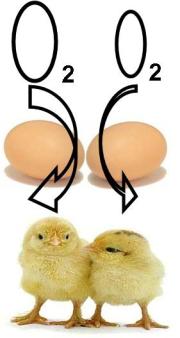Genetic determinant of cardiac hypertrophy in chicken fetuses
by Yves Nindorera

Growth of the heart during the embryonic and fetal periods happens through proliferation of mononucleated cardiac myocytes in a process called hyperplasia. Early in the postnatal period, the cardiac myocytes loose their ability to proliferate and become differentiated as karyogenesis (formation of the nuclei of a cell) is happening in the absence of cytokinesis (cytoplasm division following nucleus division). This process, called cardiac hypertrophy, is specific to organisms. In humans, 90 % of the cardiac myocytes are binucleated in later gestation and up to 97 % are binucleated within seven weeks after birth. In chickens, however, all cardiac myocytes are mononucleated at day one after hatching. The terminal differentiation of cardiomyocytes is first seen after hatching, and 18% of the cardiomyocytes are binucleated at day 15.
I did the present study to find out which genes are differentially expressed in hypoxic conditions compared to normoxic conditions. To find out more about the study and the results, fill free to check the links in the menu on the left
Responsible for this page:
Director of undergraduate studies Biology
Last updated:
05/19/09
